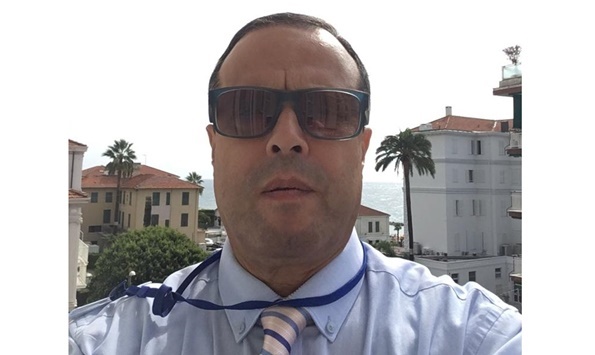In the presence of HE Sheikh Abdulrahman bin Hamad al-Thani, the activities of the “Seminar Series 2023” continued yesterday, at the Wisdom Hall of the Ministry of Culture under the title “History of Andalusia” with the participation of critic and novelist Dr Nizar Chakroun, cultural adviser at the Ministry of Culture, and members of the “Himma” team.
“Himma” was recently produced by the Ministry of Culture on Andalusian history. The members of the team are Saudi journalist and poet Badr Lami, Qatari media figures Saud al-Kuwari and Mohamed al-Shahrani. The seminar was moderated by Iman al-Kaabi, director of the Qatari Media Center.
Dr Nizar Chakroun presented a paper titled "What is the necessity today for the study of Andalusian history" (92 AH - 711 CE / 798 AH - 1492 CE). He emphasised that “returning to Andalusian history constitutes an essential step for understanding the elements of the Arab-Islamic identity. It is not possible to exclude more than eight centuries of civilisation from thinking about the cultural identity of the Arabs today. Just as the Andalusian cultural heritage cannot remain away from the Arab generations who have the right to see the symbolic wealth left by the Andalusian civilisation in Arab civilisation first and in human civilisation second.”
He pointed out “the need for a new discourse regarding that rich civilisation, so that this discourse will enable us to determine its components and its role in creating a model of progress in a period when the West was mired in its darkness.” Indicating that Spanish intellectuals have recently awakened to their neglect of the "Andalusian civilisation" as a component of their identity, so they returned to studying it, although its features are visible in their language, lifestyles, and urbanization.
Dr Nizar Chakroun, pointed out that many Spanish writers in the nineteenth century suffered from the consequences of dealing with the Arab presence in Spain due to the entry into force of the Inquisition Courts law, which was abolished in 1824 CE. While its content continued to be worked on in the norms of Spanish society for years. Chakroun stressed that the conquest of Andalusia in 711 AD was not just a geographical expansion or the spread of the Islamic religion only in the Iberian Peninsula, but rather it was a starting point for the establishment of a civilization.
Chakroun stressed out that the Andalusian culture was influenced by the scientific, intellectual and literary production of the Muslim Arabs in the East. It took many of its components, but was distinguished from it, as Andalusia became, after less than two centuries, the destination of the people of the East. He continued: “Andalusian poetry was not the only literary form that reflected the spirit of renaissance in the Andalusian literary and intellectual movement, and it was not the only influential one in Europe. Ironically, since the thirteenth century CE, Europe has benefited from the fruits of the Andalusian intellectual and scientific renaissance, while the Arabs outside Andalusia in those centuries and beyond did not pay attention to the importance of Andalusian culture.”
Chakroun said that ‘the most important gains of the Andalusian civilization is that it dealt with the Arab cultural heritage that preceded it in a critical manner. The Andalusians realized that each stage of civilization has its challenges, and the present cannot be measured by the emptiness. Their concept of time was different from what previous cultures looked at, which made Western modernity later adopt this concept. Thinking about the present prevails over thinking about the past, and this is a concept that we should adhere to and think about our present more than thinking about the past, in order to learn from this civilization that is still in need of research and discovery.
Dr Nizar Chakroun called for the importance of establishing a center dedicated to the study of Andalusian civilization to be a new civilized starting point.
The journalist Badr Lamy talked about the "Himma" program, explaining that the program tried to answer in a simple way many questions such as the reason for the conquest of the Iberian Peninsula, and what are the challenges that Muslims faced regarding the conquest? In order to understand the history of this period. The idea came from the Culture Minister, HE Sheikh Abdulrahman bin Hamad al-Thani, in order to focus on the aspiration of the men who conquered Andalusia, based on the aspiration that the Islamic faith placed in the hearts of these conquerors.
The two Qatari journalists, Saud al-Kuwari and Mohamed al-Shahrani, talked about their role in preparing and participating in the “Himma” program. Stressing that the efforts of the work team, sponsored by the Ministry of Culture, yielded filming from the same events sites to bring information closer to the viewers.
The seminar was accompanied by comments from of the poet Dr Hassan al-Nama, Chairman of the Board of Trustees of the Sheikh Hamad Award for Translation and International Understanding, who appreciated the efforts of the Ministry of Culture in promoting societal culture, pointing out that Qatar's interest in the history of Andalusia is not recent, but rather an inspiration for a legacy dating back to the history of the former ruler of Qatar Sheikh Ali bin Abdullah al-Thani, who was the first to direct the interests of the Arab region and the Gulf to the study of Andalusia out of his admiration for its heritage, and that was at a time of scarcity of information.



